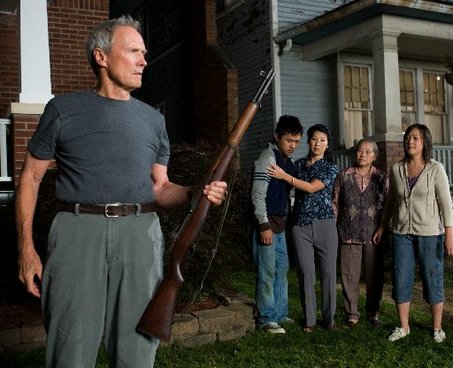
Film Friday
I’m fascinated by how films function as social barometers and am wondering what kinds of films will characterize the Age of Obama. Maybe Clint Eastwood’s Grand Torino (2008) is some kind of harbinger. (Spoiler alert: I will be revealing the end of the film.)
One career trajectory I never could have imagined (not in my wildest dreams) is that of “the man with no name” (as he was known in Sergio Leone’s spaghetti westerns). When he was starring as Dirty Harry in the 1970’s, Eastwood stood in for rightwing reaction to the tumult that was shaking America. Lines like “Go ahead, make my day” and “Do you feel lucky, punk?” gave solace to men who were angry over black empowerment, feminism, Vietnam, urban disorder, stagflation, and a host of other significant culture shocks.
Now, however, Eastwood seems to be specializing in male melodrama, what with The Bridges of Madison County, Million Dollar Baby, and, most recently, Gran Torino.
I find Gran Torino particularly interesting because it seems like a conscious refutation of Eastwood’s Dirty Harry past. The film is about a bitter old widower and bigot, Walt Kowalski, who has difficulty getting along with pretty much everyone, including his children and grandchildren. Yet in spite of himself, he becomes involved in the lives of his neighbors, Laotian Hmong who have moved into his deteriorating Detroit neighborhood.
He catches one of them trying to steal his mint condition 1962 Gran Torino (Thao has been pressured to do so by local gang members) but decides to take him under his wing and train him in a trade. As a Korean war hero, he also has the capacity to defend the Hmong from gang attacks.
This is where the film gets interesting. One is prepared to see scenes of Dirty Harry violence, albeit on behalf of non-English speaking immigrants. In other words, right-wing vigilantism on behalf of people who are being targeted by the right. (I refer you to the new anti-immigrant bill on the verge of passage in Arizona.)
But that’s not all the film does.
First, rather than celebrate vigilante violence, the film shows its limitations. Kowalski at one point resorts to a “make my day” show of force, but rather than resolving anything, this just makes the situation worse. One of the neighbor’s daughters, who has been particularly kind to Kowalski, is raped because of Kowalski’s intervention. Using violence to counteract punks, this Eastwood film seems to be saying, just begets more violence.
And then there is the ending. We are sure, following the rape, that Kowalski is going to engage in a shoot-out with the gang members. He locks up Thao in his basement so that nothing will happen to him—Kowalski doesn’t want him exacting vengeance—and then drives over to the gang headquarters.
As Kowalski reaches into his coat, the gang, thinking he is reaching for a gun, opens fire on him, killing him. But it has all been bluff, a sacrificial move on Kowalski’s part to get the gang to shoot an unarmed man. (Kowalski has terminal cancer so the move isn’t as crazy as it sounds.) The legitimate police show up, the gang is imprisoned, and peace returns to the community. Thao, not Kowalski’s family, inherits the Gran Torino.
In America as it is evolving, the film tells us, bigots and immigrants must learn to get along to deal with the common problems that confront them. And if even a Kowalski can come around, then there is hope.
Is this change we can believe in? We’ll know Obama is making an impact if comparable themes start showing up in other films. Drop me a comment if you can think of any.


4 Trackbacks
[…] killing a man really is. In fact, I’ve been recently impressed with Eastwood (as I show in my post on Gran Torino) for the way that he shows the psychological consequences of vigilantism—all the […]
[…] for the glorification of vigilante violence in those 1970’s films. (Read my post on it here.) And now GOP political operative Karl Rove is accusing him of shilling for President […]
[…] I view as an apology for (or at least revision of) his Dirty Harry films. (See my post on it here.) There the racist protagonist bonds with the Laotian immigrants who have moved into his community, […]
[…] Horton ads), but it was beginning to lose some of its force. Even Clint Eastwood started mellowing. I’ve written about how I see his film Gran Torino as an apology for the unambiguous embrace of vigilantism in […]